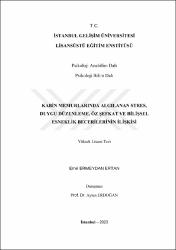| dc.contributor.author | Ermeydan Ertan, Emel | |
| dc.date.accessioned | 2023-11-28T11:26:04Z | |
| dc.date.available | 2023-11-28T11:26:04Z | |
| dc.date.issued | 2023 | en_US |
| dc.identifier.uri | https://hdl.handle.net/11363/6556 | |
| dc.description | Danışman: PROF. DR. AYTEN ERDOĞAN
Yer Bilgisi: İstanbul Gelişim Üniversitesi / Lisansüstü Eğitim Enstitüsü / Psikoloji Ana Bilim Dalı / Psikoloji Bilim Dalı
Konu: Psikoloji = Psychology
Dizin: Bilişsel esneklik = Cognitive flexibility ; Duygu düzenleme = Emotion regulation ; Kabin memuru = Cabin attendant ; Stres = Stress | en_US |
| dc.description.abstract | Yapılan araştırmanın amacı; kabin memurlarında algılanan stres, bilişsel esneklik, duygu düzenleme becerileri ve öz şefkatin birbirleri ile ilişkisini belirlemektir. Örneklem evreni Türkiye'de 22-45 yaş aralığındaki 154 kabin memurundan oluşmaktadır ve veri toplama araçları olarak Sosyo-Demografik Bilgi ve Veri Formu, Algılanan Stres Ölçeği, Bilişsel Duygu Düzenleme Ölçeği ile Öz-Anlayış Ölçeği kullanılmıştır. Araştırmanın demografik bilgilere göre sonuçları şu şekildedir: Kabin memurlarında yaş değişkenine göre algıladıkları stres, duygu düzenleme becerileri ve bilişsel esneklik düzeylerinin farklılaştığı; öz şefkat düzeylerinin farklılaşmadığı bulunmuştur. Cinsiyet değişkenine göre algıladıkları stres, öz şefkat düzeyleri, duygu düzenleme becerileri ve bilişsel esnekliklerinin farklılaşmadığı saptanmıştır. Gelir düzeyi değişkenine göre duygu düzenleme becerisi farklılaşırken; öz şefkat, bilişsel esneklik ve algılanan stres düzeylerinin farklılaşmadığı belirlenmiştir. Eğitim düzeyi ve deneyim süresi değişkenlerine göre algıladıkları stres, öz şefkat düzeyleri, bilişsel esneklikleri farklılaşmadığı saptanmıştır. Medeni durum değişkenine göre algıladıkları stres düzeyi farklılaşırken; öz şefkat düzeyleri, duygu düzenleme becerileri ve bilişsel esnekliklerinin farklılaşmadığı bulunmuştur. Çocuk sahibi olma değişkenine göre ise algıladıkları stres ve bilişsel esneklik düzeyleri farklılaşırken; öz şefkat ve duygu düzenleme becerilerinin farklılaşmadığı belirlenmiştir. Araştırmanın amacı olan kabin memurlarında algılanan stres, bilişsel esneklik, öz şefkat ve duygu düzenleme becerilerinin ilişkisine bakıldığında ise; her birinin birbirleriyle arasında anlamlı bir ilişkinin bulunduğu saptanmıştır. Bulunan sonuçlar, ruh sağlığını koruyucu programlarla kabin ekibi üyelerinin algılanan streslerini azaltmaya yönelik müdahalelerin, duygu düzenleme becerilerini, öz-şefkat ve bilişsel esneklik düzeylerini artırmaya yönelik faaliyetleri içerebileceğini düşündürmektedir. | en_US |
| dc.description.abstract | The aim of this study is to determine the relationship between perceived stress, cognitive flexibility, emotion regulation skills and self-compassion in flight attendants. The sample population consists of 154 cabin crew in Turkey between the ages of 22-45 and Socio-Demographic Information and Data Form, Perceived Stress Scale, Cognitive Emotion Regulation Scale and Self-Compassion Scale were used as data collection tools. The results of the research according to demographic information are as follows: Due to the study, the perceived stress levels, emotion regulation skills and cognitive flexibility levels of cabin crew members were found to differ based on age, while their levels of self-compassion did not differ. Perceived stress, self-compassion levels, emotion regulation skills and cognitive flexibility of cabin crew members did not differ according to the gender variable. While emotion regulation skills differ according to the income level variable; it was determined that self-compassion, cognitive flexibility and perceived stress levels did not differ. It was found that the perceived stress, self-compassion levels and cognitive flexibility did not differ according to the variables of education level and job experience. According to the marital status variable, the level of perceived stres was found to differ, but their self-compassion levels, emotion regulation skills and cognitive flexibility did not differ. According to the variable of having a children, the perceived stress and cognitive flexibility levels was found to differ; but it was determined that self-compassion and emotion regulation skills did not differ. The relationship between perceived stress, cognitive flexibility, self-compassion and emotion regulation skills in cabin crew members was exemined and it was found that there is a significant correlation between each of them. This suggest that interventions aimed at reducing the perceived stress of cabin crew members through mental health protective programs may include activities to increase emotion regulation skills, self-compassion and cognitive flexibility levels. | en_US |
| dc.language.iso | tur | en_US |
| dc.publisher | İstanbul Gelişim Üniversitesi Lisansüstü Eğitim Enstitüsü | en_US |
| dc.rights | info:eu-repo/semantics/openAccess | en_US |
| dc.subject | Kabin Memuru | en_US |
| dc.subject | Algılanan Stres | en_US |
| dc.subject | Duygu Düzenleme Becerileri | en_US |
| dc.subject | Öz Şefkat | en_US |
| dc.subject | Cabin Crew | en_US |
| dc.subject | Flight Attendant | en_US |
| dc.subject | Perceived Stress | en_US |
| dc.subject | Emotion Regulation | en_US |
| dc.subject | Cognitive Flexibility | en_US |
| dc.subject | Self-Compassion | en_US |
| dc.title | Kabin memurlarında algılanan stres, duygu düzenleme, öz şefkat ve bilişsel esneklik becerilerinin ilişkisi | en_US |
| dc.title.alternative | The relationship of perceived stress, cognitive flexibility, emotion regulation and self-compassion in flight attendants | en_US |
| dc.type | masterThesis | en_US |
| dc.department | Lisansüstü Eğitim Enstitüsü | en_US |
| dc.relation.publicationcategory | Tez | en_US |

















